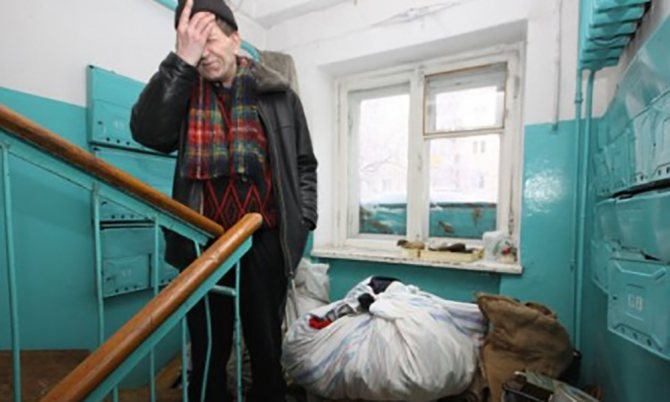Home » Housing disputes » Eviction from an apartment for non-payment of utilities
1
Almost every family experiences circumstances when their financial situation deteriorates sharply. This could be the loss of a job, a serious illness when all the money is spent on treatment, or another force majeure. At the same time, some citizens postpone paying utility bills for a month, then again and again, the financial situation does not improve, and meanwhile the debt grows.
Every citizen is obliged to pay for housing and communal services, this is the law, but utility debts in the Russian Federation are not decreasing. What is this connected with? To some extent, because citizens are confident that no one can evict them from their apartment, no matter how much debt they have accumulated. Is it so?
Can they be evicted from a privatized apartment for rent arrears?
Privatization of residential premises is the transfer of it from municipal property to private property. In this case, the owner of the apartment is obliged to bear all the costs of utility bills that are indicated in his personal account.
If the owner of a privatized apartment accumulates a sufficiently large debt on utility bills, then theoretically he can be evicted for rent arrears. In this case, the following facts will be grounds for eviction:
- a court decision on the collection of utility debts that has entered into force;
- the owner does not make even the minimum payments to repay the debt;
- the living space is not the only one.
Given the combination of these three factors, the municipality or management company can evict the debtor, but only by court decision. But, usually, the court gives the offender some time to resolve the problem (repay the debt) and only after the debtor ignores this concession from the judicial authorities and continues to accumulate debt, the court can resort to a last resort - eviction from the residential premises.
How to apply for legal protection
The claim is sent to the court at the address where the tenant is located. It can be submitted through a representative who has a notarized power of attorney. Both state authorities and municipalities can become applicants.
The claim is drawn up on the basis of the provisions of Article 131-132 of the Code of Civil Procedure of the Russian Federation. Documentation evidencing the claimed circumstances is attached to it. Based on Articles 133-135 of the Code of Civil Procedure of the Russian Federation, the application may be returned, left without progress, or refused to register it.
Can they be evicted from a municipal apartment for debts on housing and communal services?
Eviction from a municipal apartment for debts occurs in a completely different way. In this case, the owner of the residential premises is the municipality, while the debtor occupies the apartment under a social tenancy agreement.
Local authorities may terminate the contract if the employer:
- has arrears on utility bills for more than six months;
- the debt was not incurred for a good reason.
But even in this case, the owner of the residential premises cannot independently terminate the contract; he can only initiate eviction by filing a claim for termination of the rental contract in court.
The law prohibits the eviction of a tenant under a tenancy agreement “to nowhere” if he does not have alternative housing. In return, the municipality will be obliged to provide the debtor with another living space of a smaller area, most often this is a room in a dormitory. In this case, the debt for housing and communal services is not canceled; the evicted tenant will have to repay it in full.
Who can't be evicted?
The law does not allow those registered in this premises to be left without a roof over their head or evicted without providing housing:
- minor children;
- orphans;
- dependents of a deceased employer;
- pensioners who retired due to age;
- disabled people of groups 1 and 2 who became disabled during the performance of official duties or military service;
- disabled people of groups 1 and 2 due to occupational disease;
- the family of a deceased or missing law enforcement officer.
To summarize all that has been said, it should be noted that eviction from municipal housing is, as a rule, a lengthy and very nervous procedure.
But if there are legal grounds for the expulsion of a citizen, strong evidence has been collected and a competent claim has been drawn up, then it will certainly end in success.
If you find an error, please select a piece of text and press Ctrl+Enter.
Is it possible to evict an owner for non-payment of utilities?
Eviction of an owner from a residential premises occurs extremely rarely; there must be sufficiently compelling reasons for this. Moreover, even if there are such compelling reasons, the debtor cannot be evicted if this is his only residential premises suitable for living.
But if a citizen has accumulated a large utility debt and has somewhere to move, eviction is quite possible. In this case, his apartment is confiscated, sold at auction, all utility debts are repaid from the proceeds from the sale of the residential premises, and the remaining amount is transferred to the former owner of the apartment.
Can they be evicted for debt if there is a minor child in the family?
The eviction procedure follows the same algorithm as the eviction of a family without children, but when evicting a family with minors, it is necessary to involve the guardianship and trusteeship authorities, which, in turn, are unlikely to allow the eviction of a family with a small child.
Thus, attempts to evict a family with minor children for debts on housing and communal services are unpromising; moreover, if the only basis for eviction is rent arrears, which, in turn, arose due to the difficult financial situation of the family, it will be registered as low-income .
Can an apartment be taken away for utility debts?
So, there is a theoretical possibility of losing any apartment for debts on utility bills. In practice, such evictions occur extremely rarely; the procedure is quite complicated; only a court can evict debtors and only on very serious grounds.
Municipal
It is impossible to take away a municipal apartment due to the fact that it does not belong to the tenant anyway (such residential premises are owned by the municipality). But the law retains the right of the apartment owner to evict citizens if they violate the rental agreement, in this case, by allowing long-term arrears in payment of utility bills.
Eviction from a municipal apartment for debt is possible, but only if three conditions for eviction are met:
- The tenant did not make any payments on bills for housing and communal services for six months. If he has a debt, but tries to repay at least part of the debt amount, then he is not a willful defaulter and such a drastic measure as eviction cannot be applied to him.
- Rent debts accumulate without good reason. That is, the employer has the opportunity to pay, but does not do so for some reasons of his own.
- The municipality has the opportunity to provide the debtor-tenant with an alternative isolated residential premises suitable for living. it could be a separate apartment of a smaller area, or a room in a dorm. When allocating such housing, the municipality must comply with sanitary standards - at least six square meters per family member, that is, if a family of five is given a dormitory room with an area of 15 square meters, the court will not allow eviction.
Thus, if the tenant systematically violates the rental agreement and does not pay for housing and communal services for more than six months without good reason, then the municipality can initiate termination of the rental agreement and eviction of the debtor.
For example, citizen Petrov lived in a municipal one-room apartment under a rental agreement. He constantly disputed the rent bills that came in, because he considered them to be too high. At the same time, he did not provide any evidence that the payment was inflated illegally, but he did not pay the bills either.
The management company sent him notifications several times about the need to repay the debt, inviting him to draw up an agreement for installment payment if he was not able to pay the entire debt at once. But Petrov ignored these notices, declaring that until the rent was recalculated, he would not pay, and they had no right to evict him.
The municipality filed a claim in court to terminate the rental agreement and evict Petrov from the residential premises he occupied. In return, the local government agreed to provide the defendant with a dormitory room with an area of 10 square meters.
The court, having considered all the circumstances of the case and not seeing any valid reasons in the defendant’s arguments, made a decision: to terminate the rental agreement and evict the defendant to the dorm room provided to him in exchange for a one-room apartment.
Petrov had no chance of staying in a one-room apartment. He did not have any valid reasons to justify his refusal to pay for housing and communal services. The fact that he considered the payments to be unreasonably high was not supported by any evidence or calculations; naturally, this could not become a basis for refusing to satisfy the municipality’s claim.
In any case, even if he had provided all the necessary calculations, he should have submitted a request to recalculate utility bills downwards, but not accumulate a huge debt.
If the owner
If the debtor is the owner of the residential premises, then the apartment can be taken away from him only if he has alternative housing. According to the Civil Law Code of the Russian Federation, even if a citizen has a huge debt, if he has no other housing, collection under a writ of execution on his only housing is prohibited. Moreover, the possibility of eviction to other housing (dormitory or social apartments) is not provided for owners of residential premises.
It is possible to take away a residential property for debts from the owner only if several factors coincide, namely:
- Without good reason, he has not paid his utility bills for more than six months. If he pays a small amount even once every six months, the debt, no matter how huge it is, will not be grounds for an eviction claim.
- The debtor must have another, alternative housing where he can move after his apartment is taken away for debts.
In the absence of the first or second factor, the court will not make a decision on the seizure of residential premises for debts
.
In this case, in order to somehow influence the defaulter and try to collect the debt from him, bailiffs can seize the offender’s bank accounts, other valuables and items:
- stock;
- jewelry;
- vehicles;
- other valuable property.
The court may also impose an administrative penalty in the form of compulsory labor.
And only in cases where all other methods of collection have not had the desired effect, and the debtor still does not want to pay the bills, the court can decide to seize the apartment to pay off the rent debt.
Privatized
Judicial practice shows that for debts on utility bills, if the debtor has no other housing, a privatized apartment is not taken away. Otherwise, eviction from a privatized apartment is possible on the same grounds and in the same cases as the eviction of the owner of the residential premises described above.
What should the amount of debt be?
For what debt is someone evicted from an apartment?
The legislator does not specifically say what amount of debt must be in order for a citizen to be expelled from his living space.
However, there is some mention in the legislation that there is no payment from this owner for housing and communal services for six months , that is, six months, then there is also a need to apply a sanction to this citizen.
Read about the specifics of eviction from an apartment of an unregistered person or ex-spouse on our website.
Grounds for eviction for non-payment
The only basis for eviction for non-payment is long-term, more than six months, debt on utility bills.
For what debt can one be evicted from an apartment?
It is impossible to name the exact amount of debt for which eviction is possible. In each region, payments for utility services are different, just as the communal payment for a three-room apartment, where several people live, differs significantly from the rent for a one-room apartment, where one tenant lives.
Typically, the amount of debt required to initiate an eviction action is based on the monthly payment multiplied by six months.
For example, the Smirnov family must pay a monthly utility bill in the amount of 3,720 rubles. Let's calculate how much debt they must accumulate so that the management company can file a claim to evict them from their premises: 3,720 * 6 = 22,320 rubles. Only after the Smirnovs owe the management company an amount exceeding 22,320 rubles can the latter file an eviction claim.
Where are they being evicted?
Of course, if you are evicted for utility debts, you will not end up on the street. If you live in a council flat, the local authority will be required to provide you with alternative accommodation. But, most likely, it will be a room in a dorm, or at best a separate apartment of a smaller area and less comfortable.
The provision of alternative housing occurs according to social standards - at least six square meters per family member. For example, a family of two will be moved to a dorm room with an area of at least 12 square meters. meters.
Where will they be expelled?
Many are interested in the question of where citizens who find themselves in debt and were forced to leave their homes as a sanction are evicted.
In this situation, there is only one possible option - these persons are settled in municipal apartments , if there are any available on the balance sheet of a particular municipality.
No one has the right to evict citizens anywhere, so if there are no vacant municipal premises, the tenant will have to postpone eviction.
Valid reasons for non-payment
If a municipality or management company has initiated an eviction lawsuit for non-payment of utility bills, then any court, when considering the case, will first of all find out how this rent debt arose. And if it turns out that the reason for the debt is valid, the court will refuse the plaintiff to satisfy his claims.
What reasons are valid:
- Difficult financial situation of the debtor.
- Loss of work due to downsizing or liquidation of an enterprise.
- Long-term arrears in payment of wages.
- Unforeseen expenses for minors or incapacitated family members.
- Long-term serious illness of any family member, resulting in unplanned financial expenses.
- Getting disabled at work or as a result of an accident.
It must be borne in mind that a difficult financial situation due to alcohol abuse or drug addiction is not a valid reason. Also, the court will not accept as a valid reason the fact that the tenant forgot about the need to pay utility bills, or believed that they were too high.
How to evict a defaulter from a municipal and privatized apartment
Forced eviction from a residential premises is impossible without a court decision. At the same time, only legal entities can file an eviction claim:
- local municipality, as the owner of the residential premises (if the debtor is a citizen living in the apartment under a rental agreement);
- housing organization providing utility services.
In cases where the amount of debt specified in the claims does not exceed fifty thousand rubles, the eviction case is considered by a magistrate, but if this amount is more than 50 thousand rubles, the claim is filed in the district or city court at the place of residence of the defendant.
Eviction from municipal or privatized (own) residential premises: what is the difference
A significant difference between evictions from municipal and privatized housing is the following: residents of municipal apartments are evicted with the mandatory provision of alternative living space, while citizens living in a privatized apartment are not provided with alternative housing.
Of course, when tenants evict, the new living space will be smaller in area and, most likely, poorly equipped; usually the debtor is given a room in a dormitory. At the same time, all debts on the previous personal account are not canceled, that is, the debt will have to be repaid in any case.
Residents of privatized apartments are less protected in this regard; no one is obliged to provide them with any alternative housing. But it is unlikely that it will be possible to evict them if citizens have nowhere to go at all.
Procedure for eviction from an apartment
If a citizen has fallen into arrears in payments for housing and communal services and does not try to resolve the situation in any way, the municipality or management company begins the debt collection procedure at the pre-trial stage. It consists of the following actions:
- the debtor is notified of the existence of arrears for utility services, most often this is a written notification, but notification is also possible by telephone or during a personal visit to an employee;
- he is offered options for getting out of this situation: repaying the debt in full within a short period of time (usually a month), or drawing up an agreement on debt restructuring (usually drawn up for six months);
- waiting for the debtor's reaction.
If no response is received within the time specified in the notification, the municipality or utility services file a claim in court to collect the debt on utility bills forcibly. This is the second, judicial stage of debt collection.
Since 2020, such collection occurs in accordance with the court order of the magistrate.
This is followed by the execution of the court order by SSP officers.
If the debtor has a job or has another permanent source of income (for example, a pension), the SSP employee sends a writ of execution to the organization where the debtor works, or to the Pension Fund of the Russian Federation, according to which monthly payments will be made in accordance with the document.
In cases where the debtor does not have a permanent income, or it is insufficient to collect the debt, the bailiffs have the right to seize any property of the debtor with the exception of the residential premises in which he lives and which is his property.
If the debtor ignores the court decision, and there is not enough property to repay the debt, the second phase begins: the eviction of the debtor from the residential premises he occupies: the municipality or management company files a claim for eviction in court. The algorithm of actions is as follows:
- The debtor is notified that if he fails to repay his rent debt, he will be evicted by court.
- If there is no response from the violator, a statement of claim for eviction is drawn up and the necessary documents are prepared.
- The plaintiff files a claim with a package of documents attached to it.
- Court hearings are underway.
- If the court decision is positive for the plaintiff, he receives a writ of execution.
- This document is transferred to the SSP, where the service officer, on the basis of the writ of execution, opens enforcement proceedings.
- The last stage is voluntary or forced eviction.
Documentation
In order for the court to accept the claim for consideration, a number of documents will need to be attached to it:
- power of attorney to represent the interests of the plaintiff in court;
- a copy of the rental agreement (if the housing is municipal);
- a copy of the title documents for the apartment (if it is privatized);
- an extract from the house register;
- extract from personal account;
- receipt for payment of state duty.
The main evidence in the case will be an extract from the personal account; it is in this document that all receipts (or non-receipts) of funds for payment of utility bills are reflected.
Deadlines
The standard period during which court cases are considered is two months from the day the statement of claim was filed. In practice, these deadlines are very rarely observed, since cases of eviction of citizens require scrupulous consideration of all the nuances, because we are talking about where people will have to live in the future.
Cases involving the eviction of the owner of a residential property are especially difficult; in this case, litigation can drag on for several years.
Price
All financial costs for filing eviction claims are borne by the plaintiff, in this case the management company or municipality. The cost of the state duty for claims of a non-property nature for legal entities is six thousand rubles, and it is this amount that will constitute the legal costs of the plaintiff.
In the event that the court satisfies the plaintiff’s demands, it shifts all costs to the defendant in the case. In this case, the debtor, in addition to the direct utility debt, will have to pay:
- legal expenses of the plaintiff (6,000 rubles for payment of state duty);
- enforcement fee SSP (it may include payments upon notification of the debtor, for storage of seized property, etc.).
Timing and cost
When filing a claim in court, payment of a state fee is required. In 2020, the state fee for a claim for expulsion from social housing is 300 rubles .
If the plaintiff wishes to use the services of a lawyer, then the cost of filing a claim and protecting his interests will depend on the individual prices of the specialist. Completely conducting a case without the participation of the plaintiff can cost several tens of thousands of rubles.
How long will it take? Practice shows that the expulsion of a tenant from municipal housing is a very long process and will take at least seven months:
- Reception and consideration of the case in court - two months (Article 154 of the Code of Civil Procedure of the Russian Federation).
- The issuance of a court decision and consideration of a cassation appeal takes two months (Articles 119 and 348 of the Code of Civil Procedure of the Russian Federation).
- Return of the case from the cassation instance and issuance of a writ of execution – one month (Article 428 of the Code of Civil Procedure of the Russian Federation).
- Enforcement proceedings in the case by bailiffs, expulsion of a citizen - two months (Article 36-FZ of October 2, 2007 No. 229-FZ “On Enforcement Proceedings”).
And this is with the “ideal” passage of the case through the authorities.
In practice, consideration of the issue may be delayed and the consideration of the case is constantly postponed to a later date due to insufficient evidence, requests for new papers, failure of the defendant to appear, appeal of the court decision, etc.
The main difficulties with eviction for non-payment of utilities
Eviction from a residential premises is not a pleasant procedure; it is used only in cases where all other ways to collect the debt have been exhausted and have not brought results. But even in this case, the initiator of the eviction will face many difficulties and prohibitions:
- The law prohibits eviction for non-payment from the only dwelling, regardless of the reasons for the occurrence of utility debt. This ban applies to the eviction of residential property owners, as tenants are provided with alternative housing in return.
- The eviction of families with minor children takes place with the approval and control of the guardianship and trusteeship authorities. PLOs are reluctant to give consent to the eviction of young children, or their relocation to residential premises with worse living conditions.
- If the debtor, after accepting the claim for consideration, contributes at least the minimum amount to repay the debt, the court will not satisfy the eviction claim, since any minimum payment is considered the beginning of repayment of the debt and the violator receives a kind of immunity from forced eviction for six months.
For example, citizen Arefiev did not pay utility bills for more than six months; the debt amounted to more than forty thousand rubles. He ignored all demands to repay the debt; it was impossible to forcibly collect money from him, since he did not work anywhere and did not have any property.
The management company filed a lawsuit to evict Arefiev, which was accepted for consideration. But on the day of the court hearing, Arefiev paid part of the debt in the amount of 200 rubles and brought a receipt to the court confirming this payment. This allowed the court to postpone the eviction for at least six months, since the court did not find grounds for extreme measures: Arefiev began repaying the debt.
Some debtors use this method very successfully. They make a small payment for utilities every six months, thereby preventing the management company from starting the eviction procedure.
Refusal to consider
The case may be refused. When accepting the statement of claim and the documents attached to it, the judge determines whether all documents required by law have been provided .
If he identifies significant deficiencies in the statement of claim itself or in the attached documents, he may temporarily leave it without movement and set a deadline for making corrections.
If the comments are not corrected within this period, the judge has the right to refuse registration and return without consideration.
But this does not mean that the case is completely lost - the identified comments can be taken into account, eliminated and the claim can be filed again.
Arbitrage practice
Judicial practice of eviction of their living quarters for debts on utility bills in the Russian Federation shows that this is an extremely rare occurrence. This is due to the fact that the law prohibits eviction “to nowhere,” that is, if the evicted citizen has nowhere to move at all, the court will not decide to evict him, no matter what debt he accumulates and for whatever reasons this happens.
Almost always, municipal authorities or the court find other ways to influence the offender and collect the debt from him.
Conclusions:
- Eviction for utility debts is a rather illusory threat, that’s true. But utility services can also influence those who do not want to pay by other means: this may be by stopping the provision of utility services (cutting off electricity, water and gas supplies). Recently, utility companies have successfully used another method of influencing the debtor - they block sewer pipes.
- If you have arrears in payments for housing and communal services, then the best way out of this situation is to visit the management company. You shouldn’t wait for them to remind you of themselves and hope that everything will work out on its own. If you cannot currently pay your bills for a number of objective reasons, it is possible to draw up an agreement on debt restructuring.
- If you are late in resolving the issue pre-trial and receive a subpoena, the best solution is to immediately seek help from a competent lawyer. He will tell you what documents need to be submitted to the court to confirm the debt has arisen for a good reason; if you lose in court, he will help you file an appeal to higher judicial authorities, and he will tell you what to do and how to behave in order to avoid eviction.
FREE CONSULTATIONS are available for you! If you want to solve exactly your problem, then
:
- describe your situation to a lawyer in an online chat;
- write a question in the form below;
- call Moscow and Moscow region
- call St. Petersburg and region
Save or share the link on social networks
Author of the article
Natalya Fomicheva
Website expert lawyer. 10 years of experience. Inheritance matters. Family disputes. Housing and land law.
Ask a question Author's rating
Articles written
513
- FREE for a lawyer!
Write your question, our lawyer will prepare an answer for FREE and call you back in 5 minutes.
By submitting data you agree to the Consent to PD processing, PD Processing Policy and User Agreement
Useful information on the topic
1
How to evict your roommate from your apartment
Neither legal nor civil marriages provide guarantees of long and...

2
Is it possible to evict tenants in winter?
Renting out an empty apartment is quite a profitable business, especially...

1
Privatization of land under an apartment building
You can privatize not only a separate residential building, apartment or land...

Privatization of an apartment through the MFC
Privatization of an apartment is a complex and lengthy process, but for many...

2
How much does it cost to privatize an apartment?
Privatization of an apartment is a free procedure, but only within the cost...

1
Certificate of non-participation in privatization
The certificate of non-participation in privatization has now been replaced by an extract...








